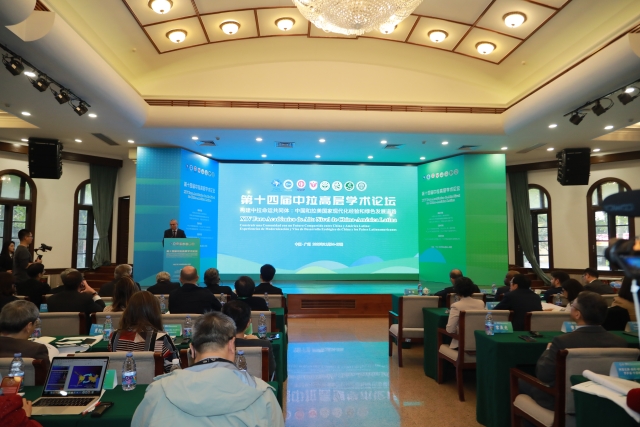
The 14th China–Latin America High-Level Academic Forum is held at Sun Yat-sen University in Guangzhou, South China's Guangdong Province, from November 24 to 25, 2025. (Photo: The 14th China–Latin America High-Level Academic Forum)
China's path to green modernization and closer strategic ties with Latin America were the focus at the 14th China-Latin America High-Level Academic Forum, taking place from November 24 to 25 at Sun Yat-sen University in Guangzhou.
The two-day event brought together scholars, policymakers, and institutional representatives to discuss "Building a China-Latin America Community with a Shared Future," with an emphasis on sustainable development and modernization experiences.
Special Representative of the Chinese Government on Latin American Affairs, Qiu Xiaoqi, highlighted Beijing's new recommendations for the 15th Five-Year Plan, describing them as evidence of "strong determination to advance Chinese modernization" while continuing high-level opening-up. He stressed that these priorities provide new opportunities to align strategies with Latin American countries.
Qiu also outlined China's achievements in ecological conservation during the 14th Five-Year Plan period: 36.6 million hectares of national land were greened, including 12.3 million hectares of newly afforested land, accounting for roughly a quarter of global new green areas. For the first time, wind and solar power installations surpassed coal, creating the world's largest and fastest-growing renewable energy system. China also leads the world in new energy vehicles, with 31.4 million in operation by 2024.
"These results show that China's path of green modernization demonstrates that development and environmental protection can advance in parallel," Qiu said, urging deeper joint action with Latin American partners on low-carbon energy transition, circular and blue economies, and green technology cooperation.
Xie Shi, vice president of Sun Yat-sen University, emphasized the university's long-standing collaborations with Latin American academic institutions. He stated that the university seeks to advance joint research, expand cultural and talent exchanges, and foster deeper mutual understanding through academic and people-to-people cooperation.
Regional organizations also underscored the widening scope of China-Latin America cooperation. Lesly David, permanent secretary of the Latin American and Caribbean Economic System (SELA), described the partnership as "inclusive and forward-looking," noting that cooperation now extends beyond trade and investment to include political dialogue, technological innovation, development cooperation, food security, digital governance, and institutional collaboration.
José Manuel Salazar-Xirinachs, executive secretary of the UN Economic Commission for Latin America and the Caribbean (ECLAC), highlighted persistent economic challenges in the region, projecting average annual GDP growth of just 0.8% between 2014 and 2024—slower than the "lost decade" of the 1980s.
He pointed to China's significant role in helping the region address development challenges, noting that bilateral trade grew 35-fold between 2000 and 2022.
Official data show that China has remained Latin America's second-largest trading partner since 2012 and the top partner for Brazil, Chile, Peru, and Uruguay. Bilateral trade reached USD 518.47 billion in 2024, up 6% year-on-year, while free trade agreements with five countries are in effect and negotiations with several others are underway.
During the forum, the Guangdong-Hong Kong-Macao University Network for Brazilian Studies was also officially launched.
William Jia, secretary-general of the network, stated that the center would focus on education and research collaboration as its "core engine," prioritizing student exchanges, scholar visits, and joint research with Brazil's leading universities.
"Our aim is to foster dialogue between civilizations and spark intellectual exchange," he said. "We hope to elevate China-Brazil relations beyond traditional trade links and towards a higher-level comprehensive strategic partnership driven by knowledge innovation and talent development."
Established in 2012, the China-Latin America High-Level Academic Forum was created by leading academic institutions from both regions, including the Institute of Latin American Studies at the Chinese Academy of Social Sciences, Social Sciences in China Press, Universidade Estadual Paulista, Universidad Nacional de Córdoba, and Universidad Andrés Bello.
Held annually on a rotating basis between China and Latin American hosts, the forum has evolved into a key venue for strategic dialogue and research collaboration, helping to shape shared development priorities.
Reporter | Liu Xiaodi, Huang Yuhan (intern)
Editor | Yuan Zixiang, James Campion, Shen He
















